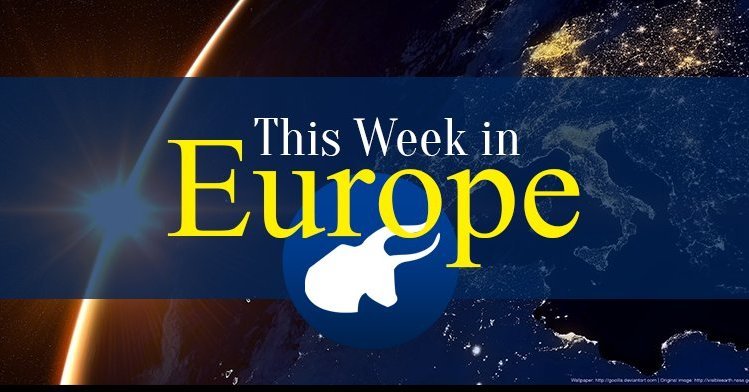Italian far-right leader: EU is destructive
Matteo Salvini, leader of the far-right Northern League, has the best chances of becoming Italy’s next PM. On Tuesday, he described his vision for the EU. He charged the media of “pumping out the propaganda of the EU”, encouraged Italy to ignore the 3% GDP deficit target set by the EU, promoted better relations with Russia but denied any intention of exiting the common currency market. The new hope of far-right populists all over Europe and the new interest of former Trump strategist Steve Bannon, Salvini was supported by MEPs belong to the Europe of National and Freedom (ENF), a nationalist party that paints migration as a threat to Christianity.
5Star Movement: Europe has nothing to fear
On Tuesday, the leader of the 5Star Movement, the most successful party coming out of the Italian general elections - with over 32% - stated that Euroskepticism was in the party’s past. Luigi Di Maio said that his first trip as PM would be to Brussels, and that his party would not impose economic measures that were opposed by the EU officials. “The Movement doesn’t plan to exit the EU or to leave the euro,” Di Maio continued. However, 5SM, despite being the largest party after the elections, are behind a center-right coalition dominated by the far-right Northern League led by Matteo Salvini. No party or coalition has enough support to govern on its own and would need to forge alliances. The 5Star leader said that if a governing coalition cannot be found, he would have no problem with another election.
European Court of Auditors: EU funds to Turkey had limited effect
On Wednesday, the European Court of Auditors published a report which showed that EU aid given to Turkey in order to ready the country for an eventual membership were not linked to concrete conditions and therefore had a limited impact. Out of the €9 billion committed to Turkey between 2007 and 2020, €3.8 billion was allocated to so-called priority sectors: the rule of law, governance and human resources (which includes education, employment and social policies). According to the ECA, the Commission has not invested heavily enough in projects to strengthen the independence of the judiciary, press freedom and civil society. It also criticizes the Commission for not making sufficient use of the tools at its disposal, including corrective measures, to enforce the proper use of the funds. Ever since the failed coup and the subsequent crackdown on the army, press and judiciary, support for Turkey’s EU accession has dwindled.
On Wednesday, EU migration commissioner Dimitris Avramopoulos said that EU should pay €3 billion more to keep refugees in Turkey despite concerns about the Turkish regime. The money is to be provided partly from the EU budget and partly from the member states and spent on housing, education and medical care given to 3 million refugees now residing in Turkey.
Another Russian exile found dead in the U.K.
Nikolai Glushkov, a former associate of the late oligarch Boris Berezovsky, a vocal critic of Russian president Vladimir Putin, was found dead in his home on Monday night. The cause of death was “compression to the neck,” British police say. Berezovsky, who was also close to the poisoned former KGB agent Alexander Litvinenko, died in 2013, in what has been described as a hanging. All three died in London. Remaining in Russia after his former boss clashed with Putin, Glushkov was charged with fraud and served 5 years in prison. After another sentencing, he fled to the U.K. His murders comes a day after PM Theresa May announced that the nerve agent used to attack former Russian spy Sergei Skripal was manufactured in Russia. Earlier this week, leaders of France, Germany, U.S. (Tillerson) and U.K. all condemned the nerve agent attack on Skripal, saying there was “no plausible alternative explanation” other than Moscow being responsible.
Slovenian PM resigns
On Wednesday, Slovenian PM Miro Cerar offered his resignation after the country’s Supreme Court ruled that a referendum on a major railway project should be repeated. The reason for the new referendum vote is that during the campaign, the government actively supported the project, thus affecting the outcome. The government means to build 27 km of railway between the city of Divaca and the port of Koper, a project worth over €1 billion. In an interim position until the formation a new government, Cerar might continue to be PM until the next elections - which are to be held in June.
Slovak PM resigns too
On the same day, Slovak PM Robert Fico offered to resign as well, this time for a different reason. The resignation comes two weeks after the murder of reporter Jan Kuciak — who was investigating alleged activity of the Italian mafia in Slovakia — and his fiancée. In fact, Kuciak was working on a story that linked a close Fico adviser and a high-level government official to an Italian crime syndicate. Roughly 50,000 people protested in Bratislava following the murder, the largest protest in the country since 1989. Soon after, President Andrej Kiska called for a government reshuffle. Earlier in the week, Interior Minister Robert Kaliňák resigned and a party within the ruling coalition threatened to leave the government unless an early election was held.
Baltic states support Poland in face of EU sanctions
Last week, the prime ministers of Latvia, Poland, Lithuania and Estonia held a joint press conference in which they opposed EU sanctions imposed on Poland for alleged breaches to the rule of law. “In this regard, all three Baltic countries think similarly,” said Latvian PM Maris Kuczinskis. The leaders of Lithuania and Estonia reinforced his statement, saying that they favor the path of further negotiation. “We understand Poland, we understand its goals related to the reform of the justice system,” said the Lithuanian PM.
Commission creates the European Labour Authority
On Tuesday, the European Commission adopted a legislative proposal establishing the European Labour Authority. With a starting budget of €11m in 2019 and increased by 2024 to €52m, the agency will assist member states in "in matters relating to cross-border labour mobility and the coordination of social security systems.” However, the European Parliament and national governments need to approve the proposal before it becomes law.
EP seeks to introduces gender equality clause in trade agreements
This week, gender equality was discussed in the plenary session at the European Parliament. After the debates, MEPs voted with 512 votes in favour and 107 against to endorse a resolution which would allow taking into account gender equality in trade agreements. The motion was championed by Malin Bjork and Eleonora Forenza, who say that free-trade agreements would have different impacts on women in sectors such as agriculture or textiles, sectors in which there are strong gender differences and often greater precarity for women. Moreover, the liberalization of the services sector would oblige women to take over tasks previously performed by the state. However, the adopted text is merely declaratory and the Commission must now decide whether it will follow up on it. However, the Commission already seems to be taking the lead as its Social Affairs Commissioner, Marianne Thyssen, announced on 12 March the inclusion of specific provisions on gender in the trade agreement with Chile.
Thousands of students on strike in the Czech Republic
Students from more than 300 universities and high schools all across the Czech Republic went on strike on Thursday because of the approach of the top political officials to the constitution. They disapprove of the prime minister being prosecuted and the government in resignation making important decisions. The petition which was being signed during the strike was then sent to the Senate which will probably address it in April.


Follow the comments: |
|
